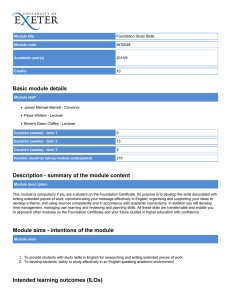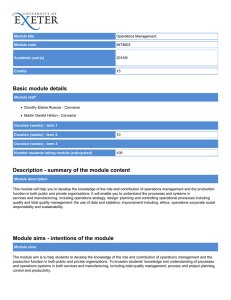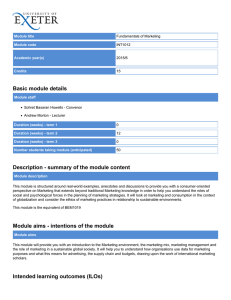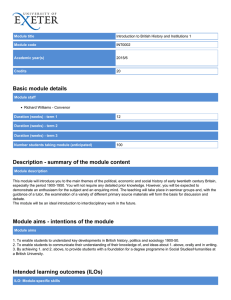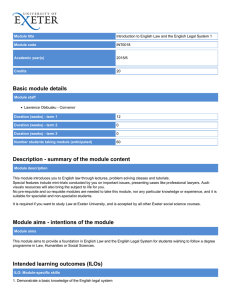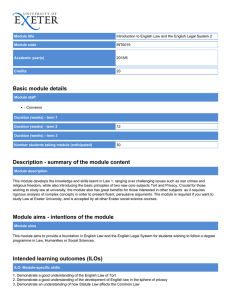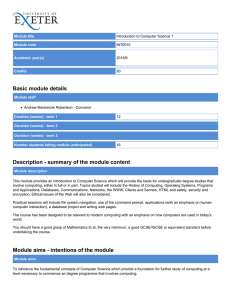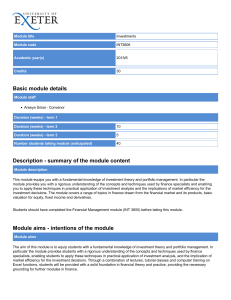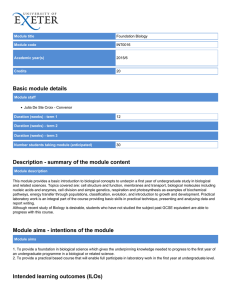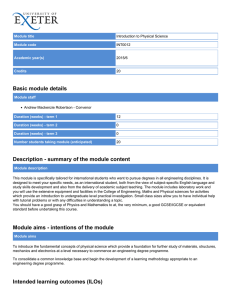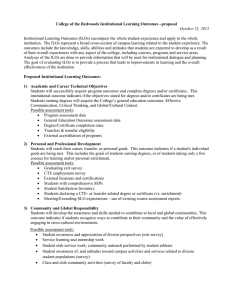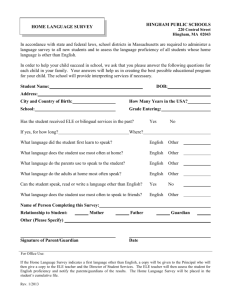Basic module details
advertisement
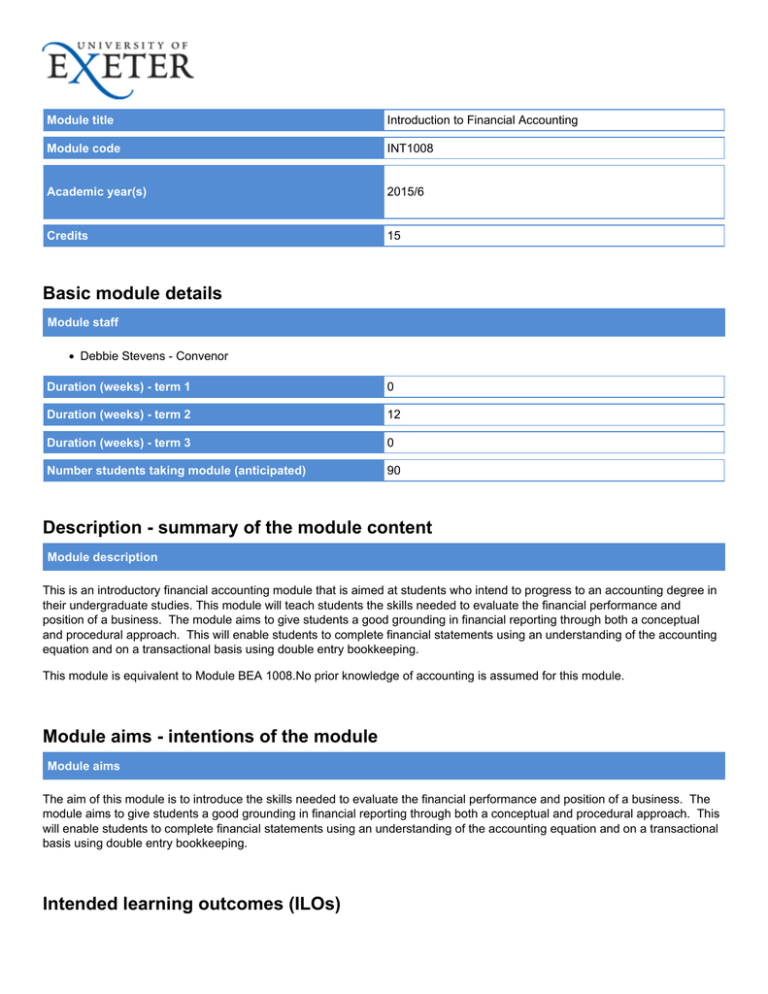
Module title Introduction to Financial Accounting Module code INT1008 Academic year(s) 2015/6 Credits 15 Basic module details Module staff Debbie Stevens - Convenor Duration (weeks) - term 1 0 Duration (weeks) - term 2 12 Duration (weeks) - term 3 0 Number students taking module (anticipated) 90 Description - summary of the module content Module description This is an introductory financial accounting module that is aimed at students who intend to progress to an accounting degree in their undergraduate studies. This module will teach students the skills needed to evaluate the financial performance and position of a business. The module aims to give students a good grounding in financial reporting through both a conceptual and procedural approach. This will enable students to complete financial statements using an understanding of the accounting equation and on a transactional basis using double entry bookkeeping. This module is equivalent to Module BEA 1008.No prior knowledge of accounting is assumed for this module. Module aims - intentions of the module Module aims The aim of this module is to introduce the skills needed to evaluate the financial performance and position of a business. The module aims to give students a good grounding in financial reporting through both a conceptual and procedural approach. This will enable students to complete financial statements using an understanding of the accounting equation and on a transactional basis using double entry bookkeeping. Intended learning outcomes (ILOs) ILO: Module-specific skills 1. define, recall and apply the recognition and measurement concepts of the accounting conceptual framework 2. analyse transactions using the accounting equation and prepare a set of financial statements 3. analyse transactions using the double-entry accounting system, explain the purpose and structure of, and prepare a general journal: general ledger and trial balance 4. Explain the requirements of IAS 1 relating to the format of, and information reflected in statement of comprehensive income, statement of financial position and statement of changes in equality and prepare closing entries 5. explain and apply the recognition and measurement principles relating to inventory 6. explain and apply the recognition and measurement principles relating to property, plant, and equipment 7. explain and apply the recognition and measurement principles relating to accounts receivable and prepare a bank reconciliation statement 8. explain the characteristics of a partnership; prepare financial information for a partnership including the admission of a partner and the dissolution of a partnership 9. explain the characteristics of a company; prepare financial information for a company, including accounting entries relating to share issues and debenture issues 10. describe the relevance of cash flow information and prepare a statement of cash flows ILO: Discipline-specific skills 11. apply the fundamental accounting concepts and to practical situations 12. apply recognition and measurement principles to specific financial statement items to prepare financial statements ILO: Personal and key skills 13. demonstrate basic written and numerical communication skills 14. demonstrate basic problem-solving skills Syllabus plan Syllabus plan 1. 2. 3. 4. 5. 6. 7. 8. 9. 10. The accounting conceptual framework. The accounting equation and the analysis of transactions. Recording of external transactions and internal transactions. Preparation of financial statements and closing entries, including income statements, recognised gains and losses. Inventory and cost of sales. Property, plant and equipment. Account receivable / Cash and bank. Non-current and current liabilities. Accounting for partnerships / Accounting for companies. Statement of cash flows. Learning and teaching Learning activities and teaching methods (given in hours of study time) Scheduled Learning and Teaching Activities Guided independent study Placement / study abroad 60 90 0 Details of learning activities and teaching methods Category Hours of study time Description Scheduled learning and teaching activities 24 Lecture Scheduled learning and teaching activities 36 Seminar – these will be teacher led. You should prepare for each seminar based on the related lecture Study Clinic 12 Optional sessions to reinforce key skills Guided Independent Study 40 Reading and research Guided Independent Study 14 Practice of techniques Guided Independent Study 24 Web-based activities Assessment Formative assessment Form of assessment Size of the assessment (eg length / duration) ILOs assessed Feedback method Weekly seminars for discussion 3 hours preparation by student / 3 hours in-class discussion 1-14 In class Summative assessment (% of credit) Coursework Written exams Practical exams 20 80 0 Details of summative assessment Form of assessment % of credit Size of the assessment (eg length / duration) ILOs assessed Feedback method In-class test 20 45 minutes 1,11-14 Examiners’ report on ELE Written exam 80 2 hours 1-13 Suggested solution on ELE Re-assessment Details of re-assessment (where required by referral or deferral) Original form of assessment Form of re-assessment ILOs re-assessed Timescale for reassessment All 1 - 14 Up to 12 weeks Written exam Re-assessment notes Where you have been referred/deferred for the module you will have the opportunity to take a second exam in the reassessment period. This will constitute 100% of the marks for the module. The questions set for re-assessment will ensure that all the ILOs are met. A referred exam will be capped at 40%. Resources Indicative learning resources - Basic reading Schemes of work are given to students at the beginning of the module with suggested text as preparatory reading. Cox, D (2012) Business Accounts 4th Edition, Osborne Books. Module has an active ELE page? Yes Indicative learning resources - Web based and electronic resources ELE – http://vle.exeter.ac.uk/course/view.php?id=3291 (Cohort 1) http://vle.exeter.ac.uk/course/view.php?id=3292 (Cohort 2) ELE will have copies of lecture notes, PowerPoint presentations, and a number of relevant articles. Students will make use of the discussion forum posted on ELE, in addition to other resources (online quizzes). MyAccountingLab Indicative learning resources - Other resources Textbooks from the INTO resource centre Extra handouts Other details Module ECTS 7.5 Module pre-requisites None Module co-requisites None NQF level (module) 4 Available as distance learning? No Origin date July 2011 Last revision date 31/07/2013 Key words search Financial accounting; conceptual framework; accounting equation; analysis; transactions; recording; statements; entries; inventory; cost of sales; property, plant and equipment; receivable; cash; Non-current; current liabilities ; partnerships; companies; Statement of cash flows; income statement; recognised gains; losses.
